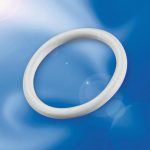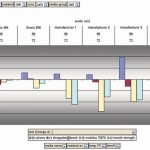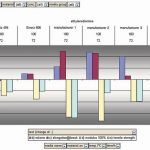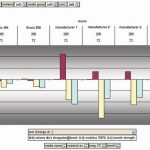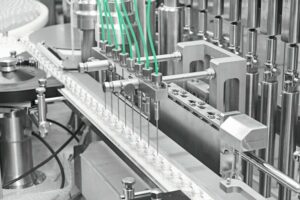Ideally, seals made of elastomeric materials should offer lasting resistance to aggressive media, high temperatures, high pressures or a combination of the above. And for elastomer seals employed in pharmaceutical applications, the demands are even higher. Owing to the various substances, materials and chemicals used, which come from different classes and occur in different physical states, the requirements matrix is extremely complex.
The author: Julia Eckstein Application Consultant, Freudenberg Process Seals
Perfluoroelastomers have proven to be ideally suited sealing materials for various applications linked to pharmaceutical processes. They are used wherever conventional elastomers offer insufficient heat or chemical resistance and PTFE seals are ruled out due to their inflexibility.
In Simriz, Freudenberg Process Seals has de-veloped a high-performance FFKM that, with a fluorination level of 72 %, offers media resistance comparable to that of PTFE (fluorination level: 76 %) with the added benefit of outstanding elasticity, ensuring reliable long-term sealing performance.
In addition to heat and chemical resistance, sealing materials for pharmaceutical applications are subject to stringent purity criteria. They must meet the FDA guidelines in keeping with § 21 CFR 177.2400, not contain any animal-derived ingredients, be tested for biocompatibility using USP Class VI protocols and satisfy EU (VO) 1935/2004 requirements. This extensive list of regulations greatly limits the choice of sealing material components.
Simriz 494 complies with all of these requirements and has already proven its near-universal resistance in countless applications worldwide. Its only shortcoming: the material contains carbon and is accordingly black – meaning that, although it possesses all of the necessary traits, it does not match most pharmaceutical manufacturers’ ideal image of a “pure” sealing material.
With the development of white Simriz 506 (Figure 1), Freudenberg Process Seals has now overcome this hurdle. The white FFKM material utilises a mineral filler and, just like Simriz 494, offers dependable long-term sealing in a temperature range from -10 to +230 °C; it can also withstand short-term exposure up to 260 °C.
FFKM materials compared
Numerous experiments on these FFKM sealing materials in contact with aggressive media such as nitric acid, methyl ethyl ketone or ethylenediamine have confirmed the excellent chemical resistance of Simriz 494 and 506. At the same time, these tests have established a benchmark for analysing the differences between FFKM variants. For the purposes of the benchmark tests, the following pharmaceutical-relevant contact media and testing conditions were selected:
water and steam at 200 °C,
20 % acetic acid solution, 20 % nitric acid solution, 20 % sodium hydroxide solution, each at 98 °C,
ethylenediamine at 100 °C, and
the solvents methyl ethyl ketone at 80 °C, methanol at 64 °C, acetonitrile at 70 °C and ethyl acetate at 70 °C.
The temperatures were set just below the boiling point of the various media, simulating the most critical operating conditions. The assessment of the material resistances following prolonged exposure was based on
changes in the material’s mass and volume, and
changes in its mechanical performance.
These parameters were evaluated in a subsequent tensile test. The suitability of each material was determined on the basis of its swelling, which ideally should not exceed a limit of +10 %; the changes in the material strength should not be more than ±30 %.
Material passes all tests
The results for Simriz 494 and 506 after 72 hours of exposure to 20 % acetic acid at 98 °C show that both the swelling values and the changes in tensile strength are considerably lower than with other FFKM materials (Figure 2) and well within the tolerance range. The materials from manufacturers 1 and 2, while not swelling excessively, displayed a major loss in strength, suggesting that if the tested seals were used in contact with acetic acid, they would no longer guarantee dependable sealing after just one week in operation. The perfluoroelastomers from manufacturers 3 and 4 were quickly ruled out because of their massive swelling.
The FFKM compounds Simriz 494 and 506 also proved to be especially well-suited in contact with ethylenediamine (Figure 3), these two high-performance materials showing the smallest changes in volume and strength after 72 hours of exposure at 100 °C.
The results of the steam test (at 200 °C for 72 hours) clearly indicate that under these conditions swelling does not pose a problem for either of the materials (Figure 4). In addition, steam at these high temperatures does not produce any sizeable loss in strength in Simriz.
Chemically resistant and highly pure
Both Simriz materials consistently achieved top scores for the entire benchmark analysis battery. Thanks to a special formulation, Freudenberg has succeeded in developing a highly resistant, high-purity sealing compound: Simriz 506 satisfies FDA guidelines in keeping with § 21 CFR 177.2400, contains no animal-derived ingredients, has been tested for biocompatibility according to USP Class VI criteria and meets EU (VO) 1935/2004 requirements.
cpp-net.com/0112433
Share:



